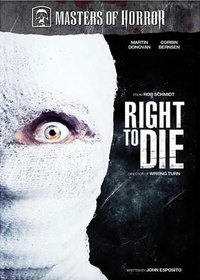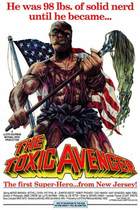Our editor-in-chief Nate Yapp is proud to have contributed to the new book Hidden Horror: A Celebration of 101 Underrated and Overlooked Fright Flicks, edited by Aaron Christensen. Another contributors include Anthony Timpone, B.J. Colangelo, Dave Alexander, Classic-Horror.com's own Robert C. Ring and John W. Bowen. Pick up a copy today from Amazon.com!
Masters of Horror: Right to Die (2007)
Credits above are only for personnel unique to this episode. For credits relating to "Masters of Horror" as a whole, see the Masters of Horror review gateway.
Showtime's anthology series "Masters of Horror" starts with a brilliant concept -- give the best directors in horror free reign to make whatever they want, limited only by the runtime (each episode must come in at under an hour) and budget (not especially high). The result has been less brilliant, with most of the directors taking their episodes as opportunities to run wild, while leaving behind whatever restraint had previously qualified them as "Masters." Right to Die, the ninth episode of the second season, has no such issues. For one thing, the director, Rob Schmidt, hardly qualifies as a "master" of anything, seeing as his entire horror filmography consists of 2003's psycho hillbilly romp Wrong Turn. Schmidt doesn't have enough of our respect to properly lose it. For another thing, Schmidt's effort is stronger than the episodes of several of his elders and betters, taking the hot-button issue of a patient's right to die and turning it into an intriguing, if necessarily terse, ghost story.
The aftermath of a fiery car accident leaves Abbey (Julia Anderson) comatose and covered in third-degree burns from head to foot. Her husband Cliff (Martin Donovan) is informed that her chances for survival are low, and even if she does make it, she may never be able to lead a normal life again. Stricken with grief, Cliff makes the difficult decision to seek a "Do Not Resuscitate" order from the court. This decision triggers off a national outrage, as his mother-in-law takes the case to the press, calling Cliff a charlatan and fighting a high-profile battle to keep her daughter alive. An already explosive political debacle turns into a terrifying personal hell for Cliff when he discovers that whenever Abbey flatlines her vengeful spirit wanders out to serve up some pain flambé.
Like many second season "MoH" episodes, Right to Die tackles a recent newsmaking event from a horror perspective -- in this case, the Terry Schiavo controversy. However, Schmidt doesn't use his film as a soapbox, preaching to us about the superiority of one side or the other. Instead, he uses the politics of the situation as a background to tell a luridly morbid tale about a man trapped by his choices and a woman who punishes those who would choose for her. Schmidt's emphasis on story over politics allows him to build some genuine chills (especially in the alternately erotic and disturbing hot tub sequence). Unfortunately, Schmidt unsummarily drops the politics two-thirds of the way through, and although the rest of Right to Die remains engaging to the end, losing a significant portion of the story makes the climax ring slightly hollow.
Right to Die suffers only slightly from the major issue that plagues most of the "Masters of Horror" episodes -- an adherence to the "macabre morality tale" format made most famous by "Alfred Hitchcock Presents" in the 1950s and continued by "Tales from the Crypt" in the early 1990s. Maybe it's the fate of all horror/suspense anthology series to meander along this path, given that the alotted runtime is usually not enough to give the viewer a full sense of setting or character. Schmidt attempts to use these weaknesses to his advantage, however. He introduces a twist late in the episode that neatly explains seemingly inconsistent character actions, actions that Schmidt likely knew would be written off by the viewer as a fault of the format. The ploy is mostly successful -- the twist itself comes as a surprise, but it makes sense in context. Unfortunately, it doesn't have quite the impact that Schmidt had planned; we're not quite as invested in the characters as we should be, ironically due to the very time constraints that allowed the twist to work at all.
Starz Home Entertainment (previously Anchor Bay) has been treating the individual "Masters of Horror" entries as if they were feature films, loading the DVDs with featurettes, photo galleries, and commentaries. Unfortunately, not many of the episodes so far warrant this treatment. With Right to Die, Rob Schmidt gives us a worthy gem. He may not qualify as a Master, but he has a neophyte's enthusiasm and willingness to please. Seeing these qualities in Right to Die has me looking forward to Schmidt's next genre offering.








